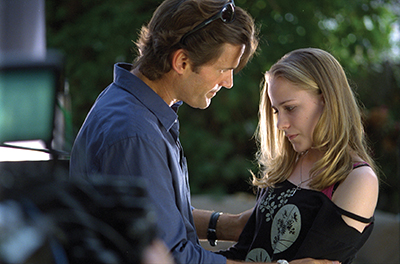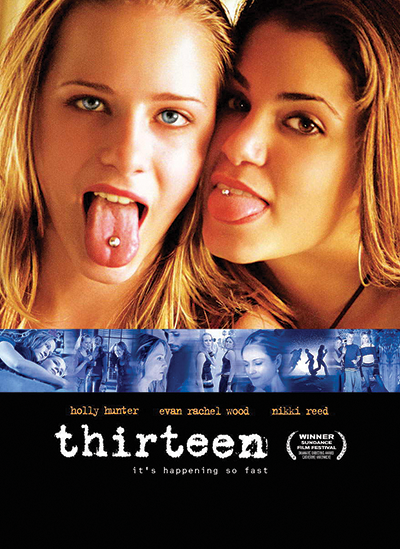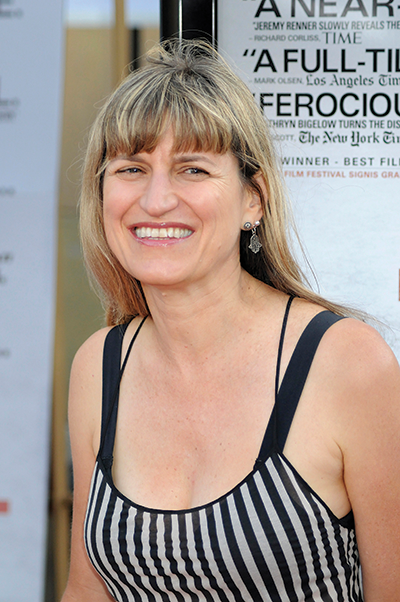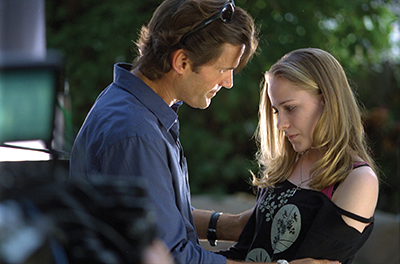 “Nipple violation!”
“Nipple violation!”
Director Catherine Hardwicke (Thirteen, Lords of Dogtown, Twilight) discovered early on that when filming a sex scene involving young actors, the most difficult element is not lighting the “action” or figuring out where to place the camera for maximum effect. It’s not deciding how much to show without showing too much. It’s not even figuring out what a “nipple violation” is.
It’s deciding where on the set to hide the welfare worker.
“With Thirteen we had to have a welfare worker on set because there were underage actors,” says Hardwicke, who was honored at last year’s Mill Valley Film Festival, where she presented her critically acclaimed drama Missing You Already. “It was so bizarre. I didn’t really have a playbook yet on how to do any of the really intimate stuff.”
 Thirteen was the 2003 film that launched Hardwicke’s career, also resulting in an Oscar nomination for Holly Hunter and a Golden Globe nom for then-14-year-old Evan Rachel Wood. The critically acclaimed movie depicts the emotional journey of Tracy, a fragile teenager (Wood), and her best friend Evie (Nikki Reed, who co-wrote with Hardwicke) as they eagerly explore the darker edges of adulthood through drugs, petty theft and increasingly questionable sex. In one controversial two-and-a-halfminute scene, the girls attempt to seduce the hunky lifeguard who lives next door to Wood and her mother (Hunter).
Thirteen was the 2003 film that launched Hardwicke’s career, also resulting in an Oscar nomination for Holly Hunter and a Golden Globe nom for then-14-year-old Evan Rachel Wood. The critically acclaimed movie depicts the emotional journey of Tracy, a fragile teenager (Wood), and her best friend Evie (Nikki Reed, who co-wrote with Hardwicke) as they eagerly explore the darker edges of adulthood through drugs, petty theft and increasingly questionable sex. In one controversial two-and-a-halfminute scene, the girls attempt to seduce the hunky lifeguard who lives next door to Wood and her mother (Hunter).
“At first, I didn’t know how to handle the scene, except to rehearse it a lot and make sure that the actresses, Nikki and Evan, were OK with it. And that their parents were OK with it,” Hardwicke says.
Kip Pardue played the neighbor, more shocked than thrilled when the girls from next door arrive to tease and arouse him.
“That’s when we had the welfare worker there, hiding behind the couch,” Hardwicke says with a laugh. “She had all these rules we had to follow. For one thing, the girls could not get within three inches of his nipples. The welfare worker would pop out from behind the couch, in the middle of the take, shouting, ‘Violation! Nipple violation!’
“Beyond that,” she continues, “how did I help the actors feel comfortable with it? And how did I help the crew get through it? I pretty quickly learned those are critical things to figure out when filming an intimate scene like that.”
Make the Audience Believe
Scenes with nudity, sensuality and what the Motion Picture Association of America calls “sexual situations” are arguably a necessary staple of modern filmmaking. Once considered merely exploitative and crass, the stuff of grindhouse movies, softcore porn and whatever Fifty Shades of Grey is, the well-crafted sex scene is now just one of many tools a filmmaker can use in telling an effective story. And as female directors oh-so-gradually prove their male counterparts’ equals in ability to deliver a financially viable film, some people in the industry are suggesting women might actually be better at filming nudity and sex.
 Hardwicke stops short of that claim. She does confirm that when filming intimate scenes of any kind, she always aims for realism and believability rather than titillation and sensationalism and works hard to make sure her performers feel safe and secure.
Hardwicke stops short of that claim. She does confirm that when filming intimate scenes of any kind, she always aims for realism and believability rather than titillation and sensationalism and works hard to make sure her performers feel safe and secure.
On days when sensitive scenes are to be filmed, no crew member is allowed to bring a cellphone onto Hardwicke’s set. The crew is trimmed to the fewest possible people. During lighting and camera setup, conversation is kept to a minimum, with the crew asked to refrain from cracking jokes, talking about their weekend or saying anything that takes away from the mood Hardwicke is trying to set.
“I even put up signs saying, ‘Respect for Actors! Quiet Zone!’ ” she says. “It’s important that we all do what we can to give the actors the right head space.”
To enter that space herself, when she set out to become a director Hardwicke took acting lessons for five years, just so she could experience what actors have to go through. It was valuable training.
“As a director, you have to give your actors a lot of confidence,” she says. “It’s a very vulnerable thing, you know, to be exposed like that, or to be an actor in a lovemaking situation. You feel awkward, you feel exposed, you feel judged — even when there isn’t a bunch of people standing around watching your every move.”
Bring the Breath Mints
Asked what skills most help her coax actors past the kind of discomfort that might manifest onscreen, she cites a commitment to advance preparation, a tendency to require lots of rehearsal and a certain gift for directorial wackiness. “In rehearsal, I try to be really goofy and really dorky, to make the actors feel relaxed and ready to play.”
Over the years she’s also learned some practical tricks that have less to do with words or mood and more to do with props like “camera-ready underwear.” “We’ll always have every kind of breath mint and toothpaste and mouthwash available on set,” she adds, “and I encourage the use of those things, to help my actors feel confident in every way.”
She also audibly narrates each steamy scene aloud as the performers act their way through it. “It’s kind of like doing a guided meditation. I might say, ‘Oh, let’s explore the neck now. Maybe it will make her feel good if you do something soft to her neck.’ Or, ‘Mmmmm. What if you gently blow in his ear, what would that be like?’ I say things like that, and most of the time, it really helps.”
Recently, directing two episodes of the upcoming USA Network show Eyewitness, she used that technique in one particularly hot sex scene, to great effect. “Afterwards, both actors both jokingly asked me, ‘Would you mind doing that with our actual spouses? Just talk us through the actual thing? Because that was really good!’ ”


